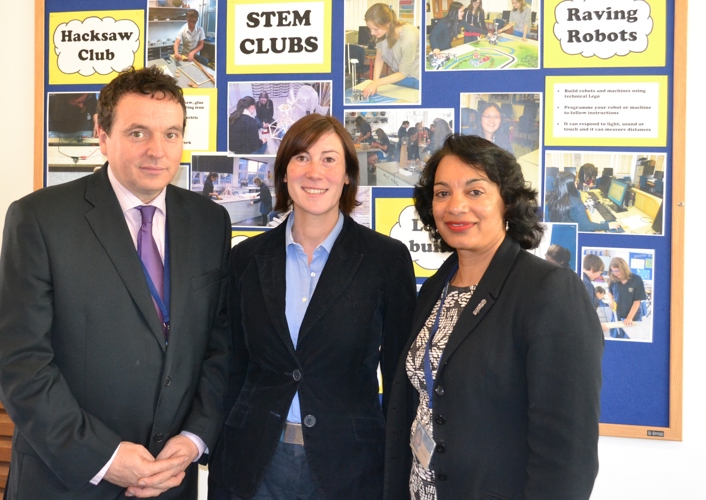The trouble with STEM in schools

Charlotte Avery, Head at St Mary’s School in Cambridge, discusses the trouble with STEM and how it’s not only girls who need encouraging…
Nationally there has been a call for girls to embrace STEM disciplines (science, technology, engineering and mathematics). Campaigns have encouraged girls to consider taking STEM subjects by representing the broad range of potential careers available to those who pursue them at A Level and beyond, appealing to girls’ interests in ‘making a difference’ through solving real world issues, such as water management in drought stricken countries or finding cures for devastating diseases. What’s more, research has been undertaken to establish how best to teach these subjects to girls in ways which suit their learning styles, in an attempt to buck the national trends which see girls both fleeing from these subjects and underperforming when they do take them.
Girls need to be provided with careers advisors and be exposed to real-world success stories through inspirational role models, both in-school via expert speaker programmes and outside of school through lectures and workshops on related disciplines. It is also imperative that students have the benefit of learning from teachers who are experienced in their field, passionate about sharing their knowledge with students, and for whom teaching is a vocation.
Thankfully at St Mary’s School, Cambridge we are able to offer our students all of the above – we attract exceptional teaching staff and are committed to encouraging girls to pursue and achieve highly in STEM subjects. Sadly, though, not all schools are as fortunate as ours – a low uptake in STEM subjects for a number of years has led to a dearth of qualified teachers, especially in physics and mathematics. In the same way that much has been done (and there is much more still to do) to encourage women in to STEM, there is now a call to ensure that STEM professionals, especially within physics and mathematics, are encouraged into teaching. There has been a major focus over the last five years on attracting more people to teach physics and mathematics and, while the 13 initiatives currently being trialed by the Association of School and College Leaders (ASCL) are an excellent start, we would suggest a new flexible approach to teaching STEM subjects be implemented too.
Our Head of Physics, Mrs Delia Russell, recommends that: “Schools should provide more timetabling flexibility in STEM subjects. If individuals can be encouraged to see teaching physics and mathematics as a crucial part - but not the only element - of what they do in their working lives and their local communities, then teaching these subjects could be made much more attractive. For example, each school’s own timetabling approaches could be made flexible enough to allow these teachers to work in industry if they so choose. This approach could also be used to promote entry into physics and mathematics teaching from potential candidates who work in industry and who would be willing to come into schools to teach for a proportion of their week.”
As well as encouraging professionals to turn to teaching, Head of Chemistry and Science, Dr Cristina Alves Martins, believes that retention is also an issue: “One problem lies, in my view, in retaining teachers in the profession. Many NQTs give up after their NQT year and too many teachers give up in their first five years of teaching. The government might be able to train more teachers but if the issue of retention is not tackled, then we will continue to have difficulties in finding teachers in those subjects.”
Highlighting a passion for his subject, Head of Mathematics, Mr Darren Kelly, said: “In my view mathematics should be compulsory at A Level for all examination boards. There should be fewer subjects at GCSE so that teachers can focus on the core subjects and a few select subjects of interest to the students.” Mr Kelly also highlighted the issue of teacher pay and added: “I think that raising the salaries of teachers can be a good motivator, and I believe that core subject teachers, such as for mathematics or English, should be on a higher pay scale due to their work load and the expectations placed on them.”
In order for our girls to be inspired by, encouraged to take up, and able to thrive in STEM careers, it is vital that the campaign to encourage inspirational and encouraging subject teachers in to the classroom is also a success.
